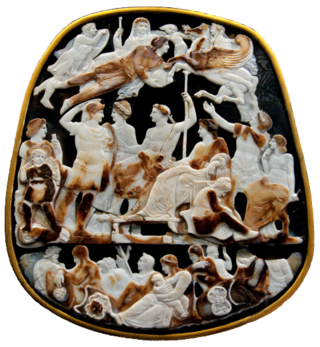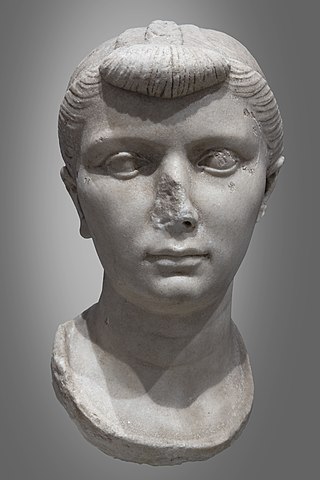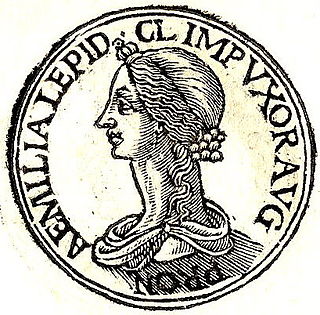Vipsania was the name of the first wife of Roman emperor Tiberius.
Vapsania may also refer to:

Agrippina "the Elder" was a prominent member of the Julio-Claudian dynasty. She was the daughter of Marcus Vipsanius Agrippa and Augustus' daughter, Julia the Elder. Her brothers Lucius and Gaius Caesar were the adoptive sons of Augustus, and were his heirs until their deaths in AD 2 and 4, respectively. Following their deaths, her second cousin Germanicus was made the adoptive son of Tiberius, Augustus' stepson, as part of Augustus' succession scheme in the adoptions of AD 4. As a result of the adoption, Agrippina was wed to Germanicus in order to bring him closer to the Julian family.

The Julio-Claudian dynasty comprised the first five Roman emperors: Augustus, Tiberius, Caligula, Claudius, and Nero.

The 30s decade ran from January 1, AD 30, to December 31, AD 39.
AD 33 (XXXIII) was a common year starting on Thursday of the Julian calendar. At the time, it was known in the Roman world as the Year of the Consulship of Ocella and Sulla. The denomination AD 33 for this year has been used since the early medieval period, when the Anno Domini calendar era became the prevalent method in the world for naming years.
This article concerns the period 19 BC – 10 BC.
Agrippina is an ancient Roman cognomen and a feminine given name. People with either the cognomen or the given name include:
Julia is the nomen of various women of the family Julii Caesares, a branch of the gens Julia, one of the most ancient patrician houses at ancient Rome.

Vipsania Agrippina was the first wife of the Emperor Tiberius. She was the daughter of Marcus Vipsanius Agrippa and Pomponia Caecilia Attica, thus a granddaughter of Titus Pomponius Atticus, the best friend of Cicero.
Vipsania Marcella is a name retrospectively given by historians to a possible daughter or daughters of the ancient Roman general Marcus Vipsanius Agrippa and his second wife Claudia Marcella Major, the eldest niece of emperor Augustus.

Vipsania Julia Agrippina nicknamed Julia Minor and called Julia the Younger by modern historians, was a Roman noblewoman of the Julio-Claudian dynasty. She was emperor Augustus' first granddaughter, being the first daughter and second child of Julia the Elder and her husband Marcus Vipsanius Agrippa. Along with her siblings, Julia was raised and educated by her maternal grandfather Augustus and her maternal step-grandmother Livia Drusilla. Just like her siblings, she played an important role in the dynastic plans of Augustus, but much like her mother, she was disgraced due to infidelity later on in her life.
Marcus Aemilius Lepidus was a patrician Roman senator, politician and general, praised by the historian Tacitus.

Julia the Elder, known to her contemporaries as Julia Caesaris filia or Julia Augusti filia, was the daughter and only biological child of Augustus, the first Roman Emperor, and his second wife, Scribonia. Julia was also stepsister and second wife of the Emperor Tiberius; maternal grandmother of the Emperor Caligula and the Empress Agrippina the Younger; grandmother-in-law of the Emperor Claudius; and maternal great-grandmother of the Emperor Nero. Her epithet "the Elder" distinguishes her from her daughter, Julia the Younger.

Octavia the Younger was the elder sister of the first Roman Emperor, Augustus, the half-sister of Octavia the Elder, and the fourth wife of Mark Antony. She was also the great-grandmother of the Emperor Caligula and Empress Agrippina the Younger, maternal grandmother of the Emperor Claudius, and paternal great-grandmother and maternal great-great-grandmother of the Emperor Nero.

The Julii Caesares were the most illustrious family of the patrician gens Julia. The family first appears in history during the Second Punic War, when Sextus Julius Caesar was praetor in Sicily. His son, Sextus Julius Caesar, obtained the consulship in 157 BC; but the most famous descendant of this stirps is Gaius Julius Caesar, a general who conquered Gaul and became the undisputed master of Rome following the Civil War. Having been granted dictatorial power by the Roman Senate and instituting a number of political and social reforms, he was assassinated in 44 BC. After overcoming several rivals, Caesar's adopted son and heir, Gaius Julius Caesar Octavianus, was proclaimed Augustus by the senate, inaugurating what became the Julio-Claudian line of Roman emperors.

Aemilia Lepida was a noble Roman woman and matron. She was the first great-grandchild of the Emperor Augustus.

The gens Vipsania or Vipsana was an obscure plebeian family of equestrian rank at ancient Rome. Few members of this gens appear in history, although a number are known from inscriptions. By far the most illustrious of the family was Marcus Vipsanius Agrippa, a close friend and adviser of Augustus, whom the emperor intended to make his heir. After Agrippa died, Augustus adopted his friend's sons, each of whom was considered a possible heir to the Empire, but when each of them died or proved unsuitable, Augustus chose another heir, the future emperor Tiberius.
Vipsania was an ancient Roman noblewoman of the first century BC. She was married to the politician Publius Quinctilius Varus and was a daughter of Roman general Marcus Vipsanius Agrippa and his second wife Claudia Marcella Major.
Vipsania was an ancient Roman noblewoman of the first century BC. She was married to the politician Marcus Aemilius Lepidus and was likely the daughter of Roman general Marcus Vipsanius Agrippa and his second wife Claudia Marcella Major.
Vipsania was an ancient Roman noblewoman of the first century BC. She was married to the orator Quintus Haterius and was likely the daughter of Roman general Marcus Vipsanius Agrippa and his first wife Pomponia Caecilia Attica.